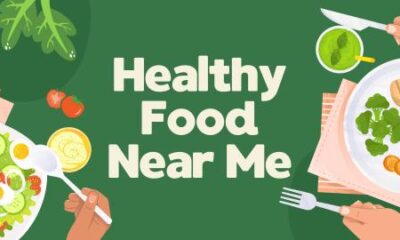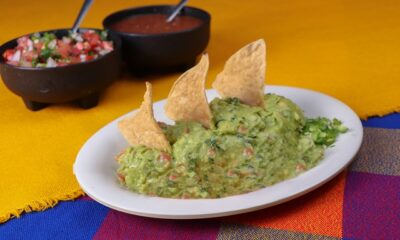Uncategorized
Gluten-free: Embracing a Healthier Lifestyle

Introduction to Gluten-free
In today’s world, the term “gluten-free” is becoming increasingly common, but what exactly does it entail? Gluten is a group of proteins found in grains like wheat, barley, and rye. For some individuals, consuming gluten can lead to adverse reactions, making a gluten-free diet essential for their well-being.
Health Benefits of Going Gluten-free
Improved Digestive Health
For those with gluten-related disorders such as celiac disease or gluten sensitivity, eliminating gluten from their diet can bring significant relief from digestive discomforts. Symptoms like bloating, stomach pain, and diarrhea often diminish or disappear entirely, leading to improved overall digestive health.
Increased Energy Levels
Many people report feeling more energetic and alert after removing gluten from their diet. By eliminating gluten-containing foods, they experience fewer energy crashes and a more consistent level of vitality throughout the day.
Potential Weight Loss
While weight loss isn’t guaranteed, some individuals find that adopting a gluten-free diet can lead to shedding excess pounds. This weight loss may be attributed to factors such as reduced calorie intake, improved digestion, and a shift towards healthier, whole foods.
Gluten-free Diet Basics
Transitioning to a gluten-free diet requires careful attention to food choices and ingredient labels. Foods to avoid include traditional wheat-based products like bread, pasta, and baked goods, as well as barley, rye, and certain processed foods. Fortunately, there are plenty of gluten-free alternatives available, including rice, quinoa, and gluten-free flours.
Navigating a Gluten-free Lifestyle
Living gluten-free doesn’t mean sacrificing flavor or variety in your diet. When dining out, it’s essential to communicate your dietary needs to restaurant staff and ask about gluten-free options. Additionally, learning to read food labels effectively can help you identify hidden sources of gluten in packaged foods, ensuring that you stay true to your gluten-free lifestyle.
Common Misconceptions about Gluten-free
Myth: Gluten-free is only for people with celiac disease
While a gluten-free diet is crucial for individuals with celiac disease, it can also benefit those with non-celiac gluten sensitivity or other health conditions. Many people find relief from digestive issues, increased energy levels, and overall well-being after eliminating gluten from their diet, regardless of whether they have a diagnosed gluten-related disorder.
Myth: Gluten-free is a fad diet
While the popularity of gluten-free diets has surged in recent years, they are far from being a passing trend. For many individuals, going gluten-free is a necessary step towards improving their health and quality of life. It’s not just about following a trend; it’s about finding what works best for your body and overall well-being.
Gluten-free and Mental Well-being
The connection between gluten and mental health is an area of growing research interest. Some studies suggest that gluten consumption may exacerbate mood disorders such as depression and anxiety in susceptible individuals. By eliminating gluten from their diet, many people report experiencing emotional improvements and a greater sense of well-being.
Gluten-free Recipes and Meal Ideas
Breakfast options
- Gluten-free oatmeal with fresh fruit and nuts
- Smoothie bowls made with gluten-free oats and mixed berries
- Eggs with sautéed vegetables and avocado on gluten-free toast
Lunch and dinner recipes
- Grilled chicken or tofu with quinoa and roasted vegetables
- Stir-fried shrimp or tempeh with rice noodles and assorted veggies
- Lentil soup with gluten-free bread or crackers on the side
Snack ideas
- Greek yogurt with honey and sliced fruit
- Rice cakes topped with almond butter and banana slices
- Homemade trail mix with gluten-free nuts, seeds, and dried fruit
Gluten-free Travel Tips
Maintaining a gluten-free diet while traveling requires some extra planning, but it’s entirely feasible with the right approach. Before your trip, research gluten-free dining options at your destination and consider packing gluten-free snacks to have on hand. When dining out, communicate your dietary needs to restaurant staff, and don’t hesitate to ask questions about menu ingredients.
Gluten-free and Athletic Performance
For athletes, fueling their bodies with the right nutrients is crucial for optimal performance. While some athletes may thrive on gluten-containing foods, others find that eliminating gluten improves their athletic performance and recovery. Many professional athletes have embraced gluten-free diets and attribute their success on the field or court to this dietary change.
Gluten-free Myths vs. Facts
Myth: Gluten-free diets are always healthier
While a well-planned gluten-free diet can be healthy, not all gluten-free products are created equal. Some gluten-free products may be highly processed and contain added sugars, fats, and preservatives. It’s essential to focus on whole, nutrient-dense foods and minimize reliance on processed gluten-free alternatives.
Gluten-free Resources and Support Groups
Finding support and community can be invaluable when navigating a gluten-free lifestyle. Online forums and social media groups provide opportunities to connect with others, share experiences, and exchange recipe ideas. Additionally, many cities have local support groups or meetups for individuals following a gluten-free diet, offering a sense of camaraderie and understanding.
Gluten-free and Children
Managing a gluten-free diet for children requires careful planning and attention to their nutritional needs. Parents should work closely with healthcare providers and dietitians to ensure their child receives adequate nutrients while avoiding gluten-containing foods. Fortunately, there are plenty of kid-friendly gluten-free recipes and products available to make mealtime enjoyable for the whole family.
Gluten-free and Aging
As we age, our nutritional needs may evolve, and certain dietary changes, such as going gluten-free, can support overall health and well-being. For older adults with gluten-related disorders or digestive issues, a gluten-free diet may help alleviate symptoms and improve quality of life. By prioritizing whole, nutrient-rich foods, older adults can maintain vitality and independence as they age.
Challenges of Going Gluten-free
Transitioning to a gluten-free diet can present various challenges, both practical and emotional. Social situations, such as dining out or attending gatherings, may require extra planning and communication to ensure gluten-free options are available. Additionally, individuals may experience cravings for gluten-containing foods and struggle to find satisfying substitutes. However, with determination and support, navigating these challenges becomes more manageable over time.
Conclusion
In conclusion, embracing a gluten-free lifestyle can lead to significant improvements in health, vitality, and overall well-being. By eliminating gluten from your diet and focusing on whole, nutritious foods, you can experience benefits such as improved digestion, increased energy levels, and enhanced mental clarity. While the journey to gluten-free living may present challenges, the rewards of better health and happiness make it a worthwhile endeavor.
Unique FAQs
- Is going gluten-free necessary for everyone? While a gluten-free diet is essential for individuals with celiac disease or gluten sensitivity, it may not be necessary for everyone. It’s essential to consult with a healthcare professional before making significant dietary changes to ensure they are appropriate for your individual health needs.
- Are gluten-free products healthier than their gluten-containing counterparts? Not necessarily. While some gluten-free products are made with wholesome ingredients, others may be highly processed and contain added sugars and fats. It’s important to read food labels carefully and choose gluten-free foods that are nutrient-dense and minimally processed.
- Can I still enjoy my favorite foods on a gluten-free diet? Yes! Many traditional favorites can be made gluten-free with some adjustments to ingredients and preparation methods. There are also plenty of gluten-free alternatives available in stores or online to satisfy cravings for bread, pasta, and other gluten-containing foods.
- How long does it take to see the benefits of a gluten-free diet? The timeline for experiencing benefits from a gluten-free diet can vary depending on individual factors such as health status, dietary habits, and lifestyle. Some people may notice improvements in digestive health and energy levels within a few weeks of eliminating gluten from their diet, while others may take longer to see significant changes.
- Is it possible to dine out safely while following a gluten-free diet? Yes, with proper communication and planning, it’s entirely possible to dine out safely on a gluten-free diet. Many restaurants offer gluten-free menu options or can accommodate dietary restrictions upon request. It’s essential to communicate your needs clearly to restaurant staff and ask questions about menu ingredients to ensure a safe and enjoyable dining experience.
-

 Uncategorized2 months ago
Uncategorized2 months ago15 Deceptive Myths About Nutritious Eating We’ve Embraced for Generations
-

 Uncategorized1 month ago
Uncategorized1 month agoNavigating the Pursuit of Wellness: Unveiling the Domain of Healthy Food Near Me
-

 Snacks and Appetizers5 months ago
Snacks and Appetizers5 months agoCrunchy crisps from the oven: the perfect snack without the shame
-

 Lunch and Dinner Recipes5 months ago
Lunch and Dinner Recipes5 months agoSeafood sensation: delicious and nutritious fish recipes for a healthy dinner
-

 Lunch and Dinner Recipes5 months ago
Lunch and Dinner Recipes5 months agoVegetarian Stir-Fry: A Burst Of Health And Flavor In Every Bite
-

 Breakfast Recipes6 months ago
Breakfast Recipes6 months agoHomemade power bar: the excellent grab-and-go breakfast option for an active early morning
-

 Snacks and Appetizers6 months ago
Snacks and Appetizers6 months agoDeliciously hot Guacamole and salsa recipes to enhance the great experience
-

 Breakfast Recipes6 months ago
Breakfast Recipes6 months agoProtein-Packed Pancakes: A Delicious Method To Start Your Day


